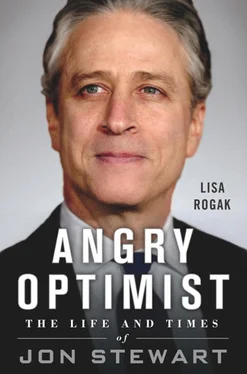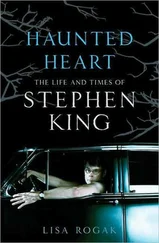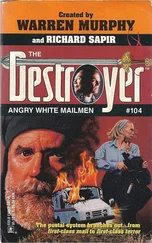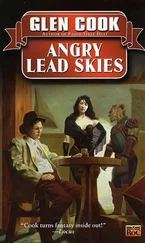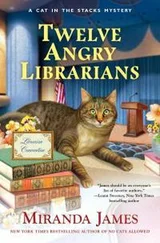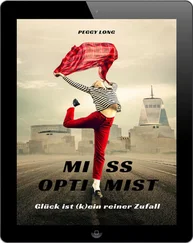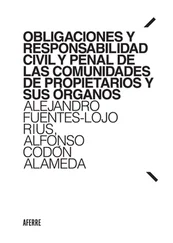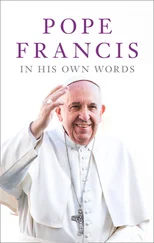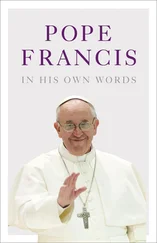“The rally is like everything that we do, it’s merely a construct,” Stewart said. “It’s just a format in the same way that the book is a format or the show is a format. [They all] translate the type of expression that we do, and it’s to be filled with the type of material that Stephen and I do, and the point of view.”
Though Stewart’s rally began as a joke on his show, public support quickly grew and Colbert joined in with his idea for a simultaneous March to Keep Fear Alive rally. The two promoted their respective events on their shows, and soon crowd estimates grew to almost seventy thousand people—thanks to a Facebook page set up for the event—which necessitated moving the rallies from the Washington Monument to the National Mall.
In promoting the rally, Stewart maintained that it was intended to send the message that the vast majority of Americans—from 70 to 80 percent—who are more moderate in their political beliefs, get drowned out by the vocal and extreme minority. He coined the rally’s official slogan: “Take it down a notch for America.”
“That was the point of the rally,” he said, “to deflate that idea that that’s a real conflict: red vs. blue, Democrat vs. Republican. I feel like there’s a bigger difference between people with kids and people who don’t have kids than between red states and blue states.”
As news and plans for the rally started to unfold—along with requests for press passes from media from around the world—people who couldn’t attend planned for their own rallies to occur simultaneously with the D.C. event. Even President Obama weighed in on the event, saying he was “amused” when he first heard about the rally. And both Colbert and Stewart took advantage of the interest to encourage attendees to donate to several nonprofit organizations, including DonorsChoose.org—a favorite charity of Colbert’s where public school teachers post classroom projects that need funding and people can donate money online—and the Trust for the National Mall.
Celebrities from Sheryl Crow to Ozzy Osbourne showed up, and the artist formerly known as Cat Stevens, now called Yusuf Islam—who rarely performed in public since officially retiring from the music business following his conversion to Islam in 1977—sang his signature anthem “Peace Train” with Stewart. But the gist of the show consisted of Stewart and Colbert in ramped-up versions of both their characters, building their individual cases—Stewart for the middle ground and reason, Colbert for encouraging people to be fearful of everything under the sun, as dictated by both media pundits and politicians alike—before Stewart took the mike and addressed the crowd in an artful, heartfelt speech that caught many in the crowd off guard, since it showed a sincerity rarely glimpsed on The Daily Show, last seen during his opening monologue on the first show after returning to the air after September 11, 2001.
“The press can hold its magnifying glass up to our problems, bringing them into focus, illuminating issues heretofore unseen, or they can use that magnifying glass to light ants on fire and then perhaps host a week of shows on the sudden, unexpected flaming ant epidemic,” he told the crowd. “If we amplify everything, we hear nothing. The press is our immune system. If it overreacts to everything, we actually get sicker… and perhaps eczema.”
Not surprisingly, he then turned his attention to politicians and the government. “We hear every damn day about how fragile our country is, on the brink of catastrophe, torn by polarizing hate, and how it’s a shame that we can’t work together to get things done, but the truth is we do,” he continued. “We work together to get things done every damn day. Most Americans don’t live their lives solely as Democrats, Republicans, liberals, or conservatives. Americans live their lives more as people that are just a little bit late for something they have to do, often something they do not want to do. But they do it, impossible things every day that are only made possible through the little, reasonable compromises we all make.”
For the first time in his life, in that fifteen-minute speech, Jon Stewart finally revealed a little bit of the man behind the desk. “After twelve years, [I felt] I’d earned a moment to tell people who I was.”
On the day of the rally, officials estimated the crowd at 215,000, which far outnumbered the estimated 87,000 attendees at Beck’s rally.
While Stewart was overwhelmed by the response and support at the rally, he was also surprised when a realization bubbled up from out of nowhere while he addressed the crowd. “When you’re standing at a rally and there are a hundred thousand people… [t]here’s an incredible urge to go, ‘I have the answer! Follow me!’” he admitted.
At the same time, he clearly understood that while many people thought Stewart was stepping out from behind his desk because he could clearly have a big effect and change some vital component of either politics or the media, that was never his intention in planning the rally. “I can understand the frustration of people who would be in that audience and think, ‘you’ve been complaining for twelve years, this is your chance to stop whining and do something,’” he said.
Afterward, he had to run interference and reinterpret his aims for the media, because some people—at the rally and those who viewed it on TV—misinterpreted his intentions, perhaps thinking he was presenting a serious event to encourage people to get involved in politics. Some even ventured to guess that Stewart was using the rally as a way to test the waters for his own future political campaign, but all along he maintained that it was meant to be no more than a parody while spotlighting his view that most people agree with “the idea that the conflict [in America] is left versus right when it’s actually corruption versus not-corruption.” And though Stewart’s political leanings are crystal clear to even an occasional Daily Show viewer, he wanted to convey the idea that neither left nor right is blameless since “both sides have their ways of shutting down debate.”
So he made a rare appearance on The Rachel Maddow Show on MSNBC a couple of weeks later to clear things up, but if anything, he only ended up muddying the waters further. “Whenever you go out there, whatever you put out, you can only control your intention,” he told Maddow. “You can’t control its perception or how people receive it, [but] you can control your execution.”
At times, things got a little testy between the two. “I feel like we’re doing the same thing,” said Maddow. “We both have a commitment to not lying, to telling the truth where we see it.”
But Stewart clearly disagreed. “You’re in the playing field; I’m in the stands yelling things.”
In the end, the two came to an uneasy truce that was still filled with mutual admiration. And perhaps it was no surprise when Glenn Beck, the inspiration for the rally, weighed in, critiquing the Stewart/Colbert event as on the same level as “a high school play: not good,” though he did acknowledge his admiration for Stewart. “Jon Stewart is very funny, and if I were in his position, I’d be doing a lot of the same things,” said Beck. “He takes things out of context—no worse than most of the other mainstream media—and is more interested in being funny than trying to actually understand the key messages in [my] show. I don’t think he’s looking for a Pulitzer, but his ratings are good. Good for him, keep doing what he’s doing.”
Beck maintained that Stewart was merely conveying the same message that he himself did in his August rally. But unlike Beck, Stewart was “co-opted [by the liberals]. I don’t think he liked it… he was used,” said Beck. “[When] the president himself promotes the rally, it becomes a mouthpiece for the [Democratic] Party, it became just another campaign stop. I don’t think that’s what Jon Stewart intended.”
Читать дальше
